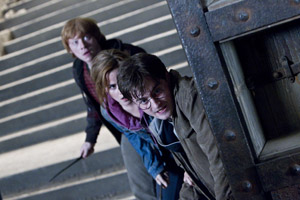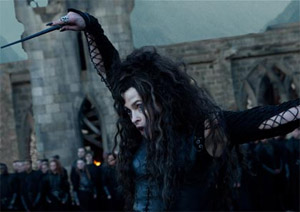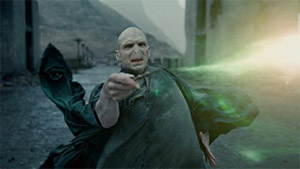“Is this all real?” Harry Potter asks a vision of his deceased professor, Dumbledore, during the long, drawn out metaphysical climax of the final Harry Potter movie. “Or is it all in my head?”
In the context of the movie, it is a pressing question for Harry, but also one which he seems to be asking by proxy for all of his fans. As the legions of Harry Potter lovers, many of whom have literally grown up with the books, found themselves closing in on the final pages of J.K. Rowling’s monstrously popular novel series, it feels as if the author is bracing them for the shock of finale.
Harry Potter has become more than just a series of children’s novels, and the incredible success of the Harry Potter series is evident in more than just the Rocky Horror-esque fanaticism that will rear its smirk-faced, wand-wielding head one last time this week. There has always been a tinge of Dungeons and Dragons escapism to the Potter madness, in which the world of Potter so thoroughly immerses the imaginations of its fans that they wonder not only if it is real, but if it is somehow realer than what we call the “real world.”
 And so young fans might follow Potter’s question to Dumbledore with a related one: if this is not real, if it is only some made up hogwash, then how the heck has it played such a huge part in forging fans’ sense of identity? Many fans have grown to think of Harry Potter as a friend, perhaps more of a compatriot or comforter than many of their peers. Potter has served as an introduction to literature’s wizard-like ability to transform lives.
And so young fans might follow Potter’s question to Dumbledore with a related one: if this is not real, if it is only some made up hogwash, then how the heck has it played such a huge part in forging fans’ sense of identity? Many fans have grown to think of Harry Potter as a friend, perhaps more of a compatriot or comforter than many of their peers. Potter has served as an introduction to literature’s wizard-like ability to transform lives.
This is the mountain of responsibility J.K. Rowling has built for herself, and the final movie of the series plays out like she is well aware of her role as literary evangelist. What started as a children’s escapist adventure about broomstick-wielding wizard kids, complete with their own distinctive Hogwarts lexicon — that galvanizing glue of the Potter-clique — has evolved into a grand epic which touches on notions of justice, heroicism, self-sacrifice, and good and evil. And the way the final movie plays, it feels as if Rowling, screenplay writer Steve Kloves, and director David Yates are cramming as many literary themes as they can into this child-sized tale.
 The focus of Harry Potter and the Deathly Hallows: Part 2 can be spilt into three parts. A dazzling battle between the evil Lord Voldemort and the good wizards of the Hogwarts school comprises a third of the movie. It must be said that the battle’s special effects fireworks are more beautiful and mesmerizing than anything else that has come off the summer blockbuster assembly line this year.
The focus of Harry Potter and the Deathly Hallows: Part 2 can be spilt into three parts. A dazzling battle between the evil Lord Voldemort and the good wizards of the Hogwarts school comprises a third of the movie. It must be said that the battle’s special effects fireworks are more beautiful and mesmerizing than anything else that has come off the summer blockbuster assembly line this year.
Another third of the film is devoted to the detective element of the Potter series, the Encyclopedia Brown appeal that gives Potter its sense of pacing and suspense. Potter (Daniel Radcliffe) and his compatriots, Ron Weasley (Rupert Grint) and Hermione Granger (Emma Watson) must hunt down the last of the horcruxes, which, when destroyed, will bring down Voldemort.
This layered action, the small heroics affecting the grander action, smacks much of J.R.R. Tolkien, who himself culled from a variety of medieval influences. However, despite the often distracting thematic similarities between the two super-popular fantasies, to say Rowling is borrowing from Tolkien, which she has been accused of, is a little unfair. The fantasy genre is a large, deep-rooted, and incestuous family tree.
 The final third is devoted to Rawlings’ working out of just what her books should be about. She dabbles in notions of the afterlife, justice, good and evil, and the nature of literature, the efforts often feeling half-baked. There is death, resurrection, ghosts, and self-sacrifice. There are tense romances and love triangles. There are tear-fishing sequences of war weary innocents that are reminiscent of World War II bomb shelter scenes. There’s a lengthy, explanatory flashback that reveals Potter’s family history, reorients our perspective on a central character, and dabbles dangerously close to Star Wars territory.
The final third is devoted to Rawlings’ working out of just what her books should be about. She dabbles in notions of the afterlife, justice, good and evil, and the nature of literature, the efforts often feeling half-baked. There is death, resurrection, ghosts, and self-sacrifice. There are tense romances and love triangles. There are tear-fishing sequences of war weary innocents that are reminiscent of World War II bomb shelter scenes. There’s a lengthy, explanatory flashback that reveals Potter’s family history, reorients our perspective on a central character, and dabbles dangerously close to Star Wars territory.
The loose ends of the Potter story are wrapped, unwrapped, and rewrapped a number of times until we finally land on the novel’s epilogue, which, as one fan explained to me, spoiled the whole thing for her. The flash forward, which shows Potter and his friends as parents bringing their own wizard children off to school, is rather cheesy and forced, but it also reminds us that this was a kids’ story to start – why not end by reengaging the thrill of that initial innocence?
And that is ultimately the problem with this well-executed, exciting, and surely to gross billions finale: it is trying to be too many things to too many people. It feels like literature worked out under the pressure of fans’ expectations. It conjures up a multitude of possible conclusions and then tries to pass them all off in a way that won’t disappoint – or horrify – any of Rowling’s young fans. With Harry Potter, Rowling has the loudest PA system of any writer in the world. She is, whether willingly or not, the great ambassador of literature to the Twitter/Facebook generation. Fantasy world or not, her story could have shown literature’s real power: fantasy, not as an escapist, value-bolstering diversion, but as a way to make better sense of the essential realities of existence.
Rowling almost gets there, and she has the opportunity to twist her tale in a way to make it a great fable about life and death, its essential value and meaning. Instead, Harry Potter manages a soft landing that doesn’t disturb, unsettle, or ultimately enlighten. It is pandering and crowd pleasing, which somehow feels like an apt way to end a limp epic that is all too much a product of our fearful, conviction-less age. By the story’s end, there is more hard wisdom in a Grimm’s Fairy Tale then in anything they teach at Hogwarts.





